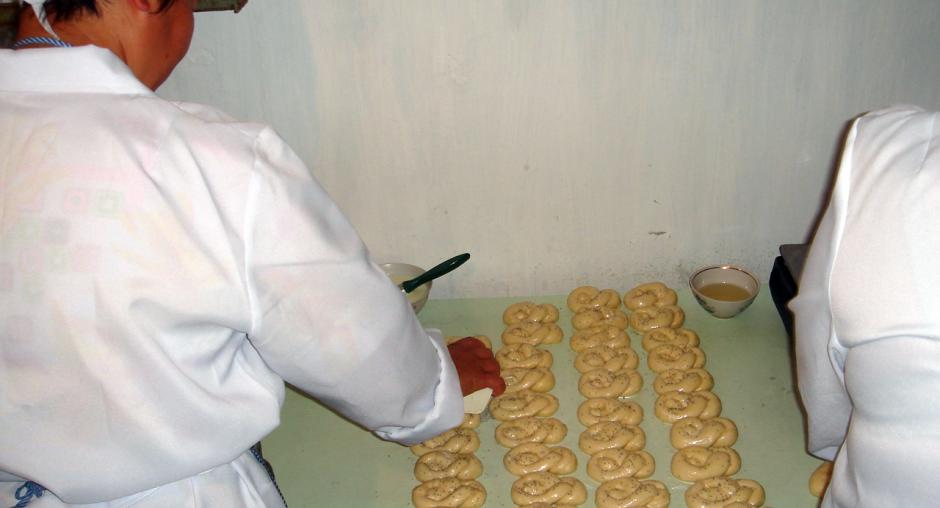OSCE brings hope to former mining village in Kyrgyzstan
The village of Min-Kush is nestled in the mountains in the remote Kyrgyz province of Naryn. During Soviet times, its status as a uranium and coal mining centre meant that it received special deliveries of goods directly from Moscow.
But although the mining industry has long been closed down and the deliveries from Moscow have been cut off, Min-Kush has seen no new economic developments in recent years. Remote and with a reputation as a contaminated area because of several nearby uranium tailings (mining waste) burial sites, the village stands as a piece of Soviet history, frozen in time.
The extreme poverty in Min-Kush has led to a population exodus. Approximately 10,000 people have been forced to leave in search of work, while the remaining 4,133 villagers currently struggle to earn a living from primitive livestock breeding, selling metal collected from uranium waste dumps and dismantling abandoned houses for construction materials.
"The remaining population in Min-Kush understand that the government is unable to resettle them, and that they must help themselves," says Kimberley Bulkley, Economic and Environmental Officer at the OSCE Centre in Bishkek.
"That is why the Centre is supporting French NGO ACTED (Aid Agency for Technical Co-operation and Development) in implementing a pilot project to promote home-grown economic development and local governance."
Supporting local entrepreneurs
One reason for the lack of local businesses in Min-Kush is the fact that there are no banks in the village, so entrepreneurs find it difficult to get funds and the necessary know-how to launch their businesses.
"To receive banking services, residents have to travel 100 km to Chayek. However, the commercial banks in Chayek require collateral, while the property of Min-Kush residents has little market value," says Artur Narynbaev, a young Min-Kush activist who currently works for the OSCE-ACTED project in mobilizing the community.
Drawing on ACTED's experience in other countries, the project has created 11 new local business groups aimed at helping the most marginalized households in Min-Kush. The groups have received vocational training and funds to set up businesses.
"The newly-created business groups specialize in sewing handicrafts, baked goods, hairdressing and livestock breeding. We are organizing roundtables in order to develop markets for their products," says Eleonora Mamatova, ACTED's Community Mobilization Manager.
Vital training opportunities
New training courses such as sewing, wool processing and vehicle repair have also been introduced to increase the skilled workforce, enabling them to fill available openings or launch new businesses.
"Training is a key factor in adapting to market economy conditions, so it is essential for us to provide high-quality training using modern equipment," comments Kimberley Bulkley.
With support from citizens and local authorities, the project has also created the first NGO in Min-Kush, named "Min-Kush Kelechegi" ("The Future of Min-Kush"). After its members had received training on local governance, the new NGO became the driving force behind all the project activities.
"The members of Min-Kush Kelechegi involved the local authorities in elaborating a village development plan, which served as a guide for project implementation," says Talant Aldashov, ACTED's Deputy Country Director for Kyrgyzstan.
"Among its many other activities, the NGO is also continuing the support of vulnerable entrepreneurs, and has established a community resource centre in Min-Kush to improve access to information and opportunities for development."
Pledging conference
Another step forward will be a pledging conference this spring, organized by the Kyrgyz Government in co-ordination with the international community, in order to raise donor funds to remove and rebury the tailings sites in Min Kush. The mountainous terrain means that there is a constant risk of landslides flooding the sites, exposing radioactive elements and contaminating the water and soil of Kyrgyzstan and downstream countries.
"It is important to empower people, especially when they are motivated to solve their own problems," adds Bulkley.
"While the OSCE is not a development organization, we recognize that reducing poverty is a fundamental element of security. This project not only provides the villagers of Min-Kush with an alternative means of generating income, it also reduces the chances of radioactive materials ending up on the market."

